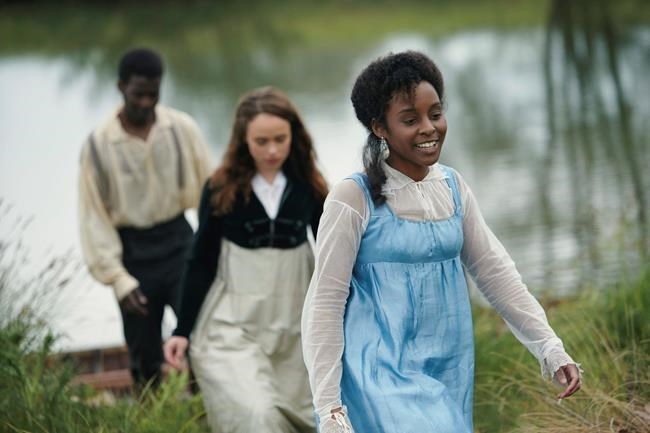
This image released by PBS shows, from left, Jyuddah James, Rose Williams and Crystal Clarke from the series MASTERPIECE: Sandition," airing Sundays on PBS. (Simon Ridgway/Red Planet Pictures/PBS via AP)
Republished February 04, 2020 - 1:26 PM
Original Publication Date February 04, 2020 - 12:01 PM
LOS ANGELES - Crystal Clarke could imagine herself playing the heroine of a period costume drama, a genre that regularly makes its way to TV and film screens with potential breakout roles for young actresses. But the African American tempered her expectations.
“I had hope for myself and I knew what I could do. But the sad part comes in: ‘Oh, other people around me would never see me that way,’” said the New Jersey-born Clarke, a graduate of the Royal Conservatoire of Scotland whose credits include “Black Mirror” and two “Star Wars” films.
Then Jane Austen came to the rescue. When the novelist died in the summer of 1817, she left behind an unfinished draft that served as source material for PBS’ “Masterpiece” drama series “Sanditon” and offered Clarke an unexpected opportunity: Miss Lambe, the sole character of colour in Austen's works.
When the script first came to her, Clarke, 26, approached it with understandable reservation. What would such a woman be if not in the background and servile?
“It's just going to be another (expletive) maid,” she recalled thinking. “When I was reading it, I was like, ”Wait a minute, there's actually a lot to it.' I was really surprised at what kind of character this was they were trying to create."
Lambe is a historically credible figure, not modern wish fulfilment for diversity, according to an expert on Austen and her times.
"Race relations were a real thing and very complex in 18th-century Britain,” said Devoney Looser, author of “The Making of Jane Austen” and an Arizona State University professor. There were an estimated 10,000 people of African or Afro-Caribbean descent in London as the 19th century approached, she said, about 1% of the city’s population of around 1 million.
Austen, who famously referred in letters to “the little bit (2 inches wide) of ivory” as her artistic canvas and “four or five families in a county village” its contained focus, should not be viewed as uninformed or indifferent to the outside world, Looser said.
“This idea that she wasn’t paying attention to history or politics is false. I think she was very keyed into history and politics,” she said, which in Austen's time would have required an understanding of the anti-slavery movement. Two Austen works, “Mansfield Park” and “Emma,” mention slavery, with one character defending another as "always rather a friend to the abolition."
Wherever Austen intended to take her incomplete novel, the task of developing it for “Sanditon” fell to screenwriter Andrew Davies, whose Austen adaptations include 1995's “Pride and Prejudice” miniseries. The characters he inherited this time around included the the briefly sketched Lambe, a young, biracial heiress from the West Indies — the centre of the British slave trade that was part of her heritage.
"There were only two words used by Jane Austen to describe Miss Lambe, 'chilly' and 'tender.' And I I took ‘chilly’ very literally to mean that she found the climate very unpleasant,” Davies said. “’Tender’ is ambiguous. I took it to mean vulnerable, quick to see slights and prejudice in others, which she does find, of course.”
She became a more spirited character in Davies' hands. Georgiana Lambe and the drama's central female character, Charlotte (Rose Williams), meet and bond as visitors to the seaside village of Sanditon. Charlotte’s love interest, Sidney (Theo James) is the orphaned Lambe's guardian on the series airing through Feb. 23 and available online at pbs.org.
“It would seem quite natural that Charlotte would befriend her, because Charlotte is a very open-minded sort of character and quick to see injustice and call it out," Davies said. “They’d be natural companions, and I thought it would be fun to give Miss Lambe quite a playful and rebellious sort of character, so as to give Sidney a hard time."
From the start, Clarke refused to approach the role passively.
“I was very wary because the writers are white, producers are white, director is white,” she said. “There were some things that, through nobody's fault except not knowing, didn't sit well with me and that I would want changed to suit the perspective of a character who's supposed to be so much in her power, or trying to find her power.”
Among her concerns: story lines that suggested Lambe's wealth would have protected her from racism, and a scene in which she laments that a man's anti-slavery efforts were taking precedence over her.
“She would never say that. She grew up on a plantation and she understands the horrors of it," Clarke said. ”It's very much of an important thing to her.”
It was at the first cast dinner that Clarke realized that she and Lambe were in good hands. The producers assured her that “'we don't want to just have you here. We want to make sure that it's done right," she recalled.
___
This story corrects the spelling of Looser in the second reference.
___
Lynn Elber can be reached at lelber@ap.org and on Twitter at http://twitter.com/elber
News from © The Associated Press, 2020